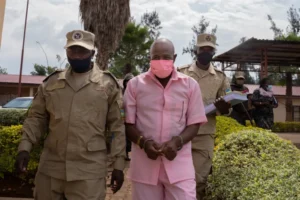Paul Rusesabagina, who was depicted as a hero in the Hollywood film Hotel Rwanda and was incarcerated in the nation for 25 years on “terrorism”-related charges, has been released after the president commuted his sentence.
According to two top officials of US President Joe Biden’s administration who briefed reporters in Washington, DC, Rusesabagina, 68, was transferred from prison to the home of Qatar’s ambassador in the Rwandan capital Kigali late on Friday. He was accompanied by a US embassy representative.
According to government spokeswoman Yolande Makolo, Rusesabagina’s plea for clemency led to the decision to commute his sentence.
However, Makolo cautioned that “no one should be under any illusions about what this means as there is consensus that serious crimes were committed, for which they were convicted.” Commutation “does not extinguish the underlying conviction” under Rwandan law, she said.
Rusesabagina, a vocal opponent of President Paul Kagame, is anticipated to be relocated to Doha, the capital of Qatar, and then to the United States, according to Majid Al-Ansari, a spokesman for the Qatari Ministry of Foreign Affairs, on Friday. In the US, Rusesabagina is eligible for permanent citizenship.
Al-Ansari stated that “the process for his transfer is underway.”
Although US officials claimed no promises were made to Kigali beyond public acknowledgement of their action, US Secretary of State Antony Blinken released a statement expressing his appreciation for the release.
The US government is thankful to the Rwandan government for making this reunion possible, according to Blinken. “It is a relief to know that Paul is reuniting with his family,” he added.
We also express our gratitude to the government of Qatar for their crucial support, which made Paul’s return to the United States possible.

Rusesabagina was given a 25-year prison sentence in 2021 for participating in a group that carried out “terrorist” attacks, though he vehemently disputed the accusations. He declined to take part in his “sham” trial, which he and his followers referred to as.
In August 2020, he unexpectedly returned to Rwanda after years of banishment. Rusesabagina boarded an aircraft in Dubai thinking it was going to Burundi, but it ended up landing in Kigali.
Rusesabagina’s rendition to Rwanda has been deemed illegal by human rights organizations, members of the US Congress, and the European Parliament. Due in part to what the US claimed to be the absence of fair trial protections in Rwanda, it declared him to have been “wrongfully detained.”
In a subsequent interview, the then-Justice Minister of Rwanda, Johnston Busingye, acknowledged that Rwanda had indeed paid for the plane that carried Rusesabagina.
Lewis Mudge, the Central Africa director at Human Rights Watch, stated that Russabagina’s release “would conclude a case that has highlighted Rwanda’s blatant disregard for international norms when it seeks to target people deemed an enemy of the state – even those far beyond their border.”
On March 13, when speaking via videolink at the Global Security Forum in Doha, Kagame hinted at a potential softening in Rwanda’s stance towards Rusesabagina’s situation.
At the time, Kagame stated that “there is discussion and there is looking at all possible ways of resolving the issue without compromising the fundamental aspects of that case.” “I believe a solution will be found,”
The US government and Qatar played a “constructive” part in the case’s resolution, according to Makolo, the Rwandan government’s spokesperson, on Friday.
The release of Rusesabagina was “discussed during meetings that brought together Qatari and Rwandan officials at the highest levels in the context of bridging views,” according to Al-Ansari, the Qatari official.
Rwanda’s move was motivated by a desire to “reset” relations with the US, according to a statement from Kagame’s press secretary Stephanie Nyombayire.
Following the release of Hotel Rwanda, which showed Rusesabagina risking his life to provide shelter for hundreds of people while serving as the manager of a posh hotel in Kigali during the 1994 genocide, in which ethnic Hutus murdered more than 800,000 people, primarily members of the Tutsi minority, Rusesabagina rose to international fame.
For his performance as Rusesabagina in the 2004 movie, American performer Don Cheadle received an Oscar nomination.
Later, Rusesabagina used his notoriety to draw attention to what he claimed were human rights abuses by the Kagame administration, a Tutsi rebel leader who came to power after his forces overran Kigali and put an end to the slaughter.
He was suspected of backing the National Liberation Front (FLN), the armed wing of the Rwandan Movement for Democratic Change, his rival political party.
Attacks in the south of the nation in 2018 and 2019 that resulted in the deaths of nine Rwandans were partially claimed by FLN.
Rusesabagina rejected any responsibility for the FLN’s atrocities.




